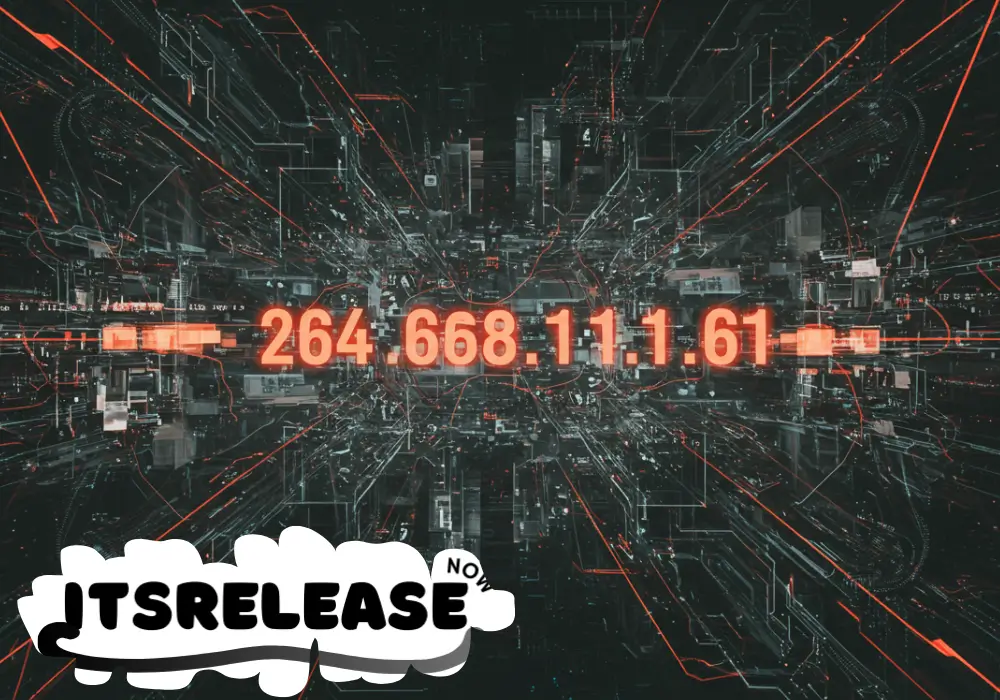Introduction
Every device that connects to a network is provided with a unique identifier and IP (Internet Protocol) address which facilitates communication between computers, servers, and websites. Data transfer over the internet will be impossible without IP addresses. This article intends to discuss IP addresses, their types, functions, and importance with respect to networking and online security. I will also use the IP address 264.68.111.161 as an example to illustrate my arguments.

Table of Contents
What is an IP Address?
An IP Address is a unique number that is used to distinguish between devices connected to the given network. Data transfer within and between networks would not be as efficient or accurate without an IP-based address for the receiver and the sender. IP addresses have set characteristics and they are allocated by an Internet Service Provider (ISP) or a network administrator. IP addresses assist users in finding and gaining access to systems, websites, applications, etc. For instance, 264.68.111.161 is an address that could either be assigned to a server or any other network-enabled device.
Types of IP Addresses
IP addresses fall under two main types: IPv4 and IPv6. The most widely used is IPv4, which has a 32-bit address format, for example, 192.168.1.1. IPv6, which was created to supersede IPv4, has a 128-bit format which allows for higher combinations of addresses. The adoption of IPv6 is growing because of the exhaustion of IPv4 and to ensure better internet connectivity and performance.
Public vs. Private IP Addresses
A public IP address is issued by ISPs and is used for communications over the Internet. It is globally unique, which means a device with this IP address can be reached from external networks. While a private IP address is used within local area networks like homes and offices and cannot be reached from the Internet. Private addresses help in security and conserve IP addresses, particularly IPv4 ones.
How IP addresses work in Networks
When accessing a website, your computer gets the IP address of the site through the Domain Name System (DNS) like any other device on that network. Unlike users, DNS servers do not need to maintain a database of IP addresses. They recite domain names, which are translated into IP addresses. Your query will be sent along a path that includes many nodes throughout other networks before reaching the desired server which will send data back in the form of a web page or other files configured for the device within the proper HTTP response.
Finding Your IP Address
To discover your public IP address, type “what is my IP” into Google. To find private IP addresses, follow these steps:
- Windows: Access Command Prompt then type ipconfig.
- Mac/Linux: Access Terminal then type ifconfig.
Knowing your IP address can resolve some network problems or help you set up security parameters on your electronics.
Can Someone Trace You Using Your IP Address?
Your IP address exposes a rough region of your location, for instance your city or Internet Service Provider. It, however, does not reveal specifics, like your home address. They can utilise your IP to trace your activity online. Knowing how tracking functions works helps you put in place measures to keep your identity safe online.
How To Keep Your IP Address Safe
To protect your digital identity, utilise a VPN (Virtual Private Network) that will conceal your IP and encrypt the outgoing traffic. To keep further websites from obtaining your IP address, set up a proxy server. Lastly, refrain from opening dubious links, changing router security parameters, and frequently deleting Internet browser cache will help protect you from advertisers and bad actors wishing to track you.
Static and dynamic IP addresses differ in many ways, such as the fact that a static IP always remains the same and is frequently used for websites, servers, and remote control systems. However, a dynamic IP is one which is assigned by an ISP and changes from time to time, which enhances security and reduces conflict between addresses. While most users with a home internet connection have dynamic IPs, businesses and companies generally prefer having static IPs as they are more reliable to use and guarantee better accessibility.
IPv4 differs from IPv6 in such aspects as the fact that it has a 32-bit address with the capability of storing around 4.3 billion unique addresses. However, because of the surge in the number of devices connected over the internet, IPv4 has been running out of addresses. On the other hand, IPv6 comes with a 128-bit address which allows for an almost limitless number of providers, improves security, increases the effectiveness of routing and decreases its efficiency. Thus, IPv6 is more effective when it comes to the future of communication with the internet.
The many and most notable features of an address or an IP is that the exposed IP address can be utilised by hackers to launch cyber attacks such as phishing, DDoS (distributed denial of service), and gain unauthorised access. These crimes may also include attempts at IP spoofing where a fake address is used to conceal true identity. Knowing the risks allows users to put into place the required security methods to help protect their information and privacy.
The Use of IP Addresses in Cybersecurity
IP addresses are essential components of any organisation’s infrastructure and digital security systems because they allow the networks to be monitored for suspicious activities. Cybersecurity systems harness IP reputation databases to block specific addresses, which greatly enhances security against malware and data breaches.
An IP-based firewall as well as an intrusion prevention system (IPS) uses IP addresses to establish connection policies that enable malicious connections to be blocked. For these reasons, correctly implementing security measures based on IP addresses bolsters the defensive perimeter.
Can You Change Your IP Address?
There are various ways to change an IP address. For most broadband connection users, simply restarting a router will often result in a different dynamic IP being assigned from the Internet Service Provider (ISP). When employing VPN services or proxy servers, the user’s actual IP address is concealed, hence anonymity is achieved.
Alternatively, a user can request the Internet Service Provider for a new designated static IP address, though this may come with extra costs. If the users’ security suspicions arise regarding the IP address 264.68.111.161, then employing these techniques might help to safeguard confidential information.
Final Words
IP addresses offer critical capabilities of sending and receiving information over the internet seamlessly. This is why knowing their types, capabilities, and security vulnerabilities is important for protection from identity theft. Regardless of trying to fix problems regarding network connectivity or safeguarding the connection, prudent management of the IP helps to ensure better privacy and a safer surfing experience.


